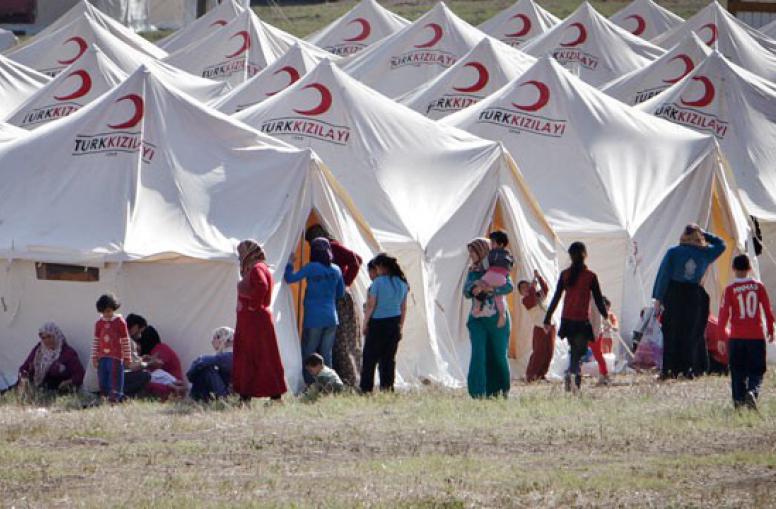Erdogan’s threats against Europe may just work
 With choleric threats and schoolyard-level barracking, Turkish President Recep Tayyip Erdogan means to bend Europe to his will. It may take more than that to shame European leaders into doing something — rather than just talking — about Syrian refugees but Erdogan is nevertheless turning up the outrage.
With choleric threats and schoolyard-level barracking, Turkish President Recep Tayyip Erdogan means to bend Europe to his will. It may take more than that to shame European leaders into doing something — rather than just talking — about Syrian refugees but Erdogan is nevertheless turning up the outrage.
On February 11th, he threatened to “open the gates” and allow hundreds of thousands of refugees to rush towards Europe. Turkey, he added sardonically, would “wish them a safe journey”.
This was part of an unnecessarily public report on a private meeting that Erdogan had in November with the European Union’s top officials, Jean-Claude Juncker and Donald Tusk.
Erdogan’s “open the gates” speech came at a particularly significant moment. Tens of thousands of refugees were massed on Turkey’s border with Syria as a consequence of the bombing of Aleppo.
The United Nations, Britain and other European countries were urging Turkey to open its borders to the Syrians.
Erdogan decided to call time on the political theatre of refugee care. “Shame on you! Shame on you!” he said to the West. “It is hypocritical to remind Turkey of its international responsibilities.”
Do Erdogan’s words have any significance beyond the acerbic rant of an increasingly authoritarian leader who has been in power too long? Yes, in the context of the refugee issue. We owe it to former British prime minister Tony Blair, another self-regarding politician with a long spell in office, for this little gem on the art of leadership: It’s about saying “no”, not “yes”. It is very easy to say “yes”.
So, in saying “No”’ or at least “No, don’t do this” to Europe, Erdogan may be forcing a necessary rethink. This may not be quite the way to conduct complex, delicate negotiations with foreign powers but who can blame him for a certain sense of betrayal?
In November, Europe promised Turkey $3.4 billion over two years, as well as visa-free travel within the Schengen area for Turks. The rushed deal was supposed to be in exchange for Turkish cooperation in keeping as many refugees as possible from getting on boats to Europe.
In the past three months, Turkey has demonstrably tried to make good on its promises with stepped-up patrols in the Aegean, a crackdown on smugglers, stiff penalties even for taxi drivers who take migrants to the coast and limited work permits for refugees who are already in-country.
Not so Europe. The promised funds are yet to be delivered to Ankara and there is no guarantee that national parliaments in Europe will agree to let Turkish citizens traipse freely through the continent.
There is little appetite for substantial concessions towards Turkey.
In some ways then, Erdogan’s free and direct speech may be the only way to move the European narrative forward with respect to refugees. With every insult he lobs at European integrity and stated good intentions, Erdogan underlines the inherent problems of Europe’s scramble to outsource the refugee problem.
This is a point that was usefully made — and supposedly understood — at the recent Syria aid conference in London. The conference, held outside Kuwait for the first time in four years, was convened by the United Kingdom, Germany, Norway, Kuwait and the United Nations and explicitly acknowledged the international community’s “responsibility to help the 13.5 million vulnerable and displaced people inside Syria, and the 4.2 million Syrian refugees in neighbouring countries”.
It raised $11 billion — more than half of which was pledged for this year — and recognised the world’s duty in supporting countries in the refugees’ immediate neighbourhood. The underlying message was a first — that Jordan, Lebanon and Turkey cannot be condemned to being low-rent buffer zones to keep refugees from Europe.
It was undoubtedly an advance on Europe’s insouciant approach to dealing with the issue in that it was forced to make common cause, consider how to share-and-care and plan for a protracted crisis rather than knee-jerk, short-term measures.
And yet, within a week of the London conference, Erdogan had to use threats and imprecations to remind Europe of its bounden duty on the refugee issue.
If it serves a purpose — by concentrating minds in European chancelleries — the outburst may prove that outrage is the most underestimated tool of international diplomacy.

